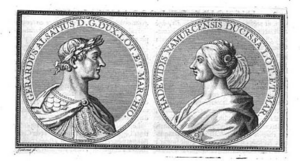Gerard, Duke of Lorraine facts for kids
Quick facts for kids Gerard I, Duke of Lorraine |
|
|---|---|

Gerard of Lorraine, and his wife Hedwige
|
|
| Duke of Lorraine | |
| Reign | 1048–1070 |
| Predecessor | Adalbert, Duke of Lorraine |
| Successor | Theodoric II, Duke of Lorraine |
| Born | c. 1030 |
| Died | 14 April or 11 August 1070 Remiremont |
| Spouse | Hedwige of Namur |
| Issue | Theodoric II, Duke of Lorraine Gerard Beatrice of Lorraine, Countess of Burgundy Gisela |
| House | House of Lorraine |
| Father | Gerhard IV of Metz |
| Mother | Gisela |
Gerard (born around 1030 – died 14 April or 11 August 1070) was an important nobleman from a region called Lotharingia. He was also known as Gerard the Wonderful.
Gerard first served as the count of Metz and Châtenois from 1047 to 1048. His brother, Duke Adalbert, gave these titles to him when Adalbert became the Duke of Upper Lorraine. When Adalbert died the next year, Gerard took over as duke. He held this important position until his own death. People at the time called him by different names, like Gerard of Alsace, Gerard of Chatenoy, or Gerard of Flanders. These names came from lands he owned or his wife's home country.
Contents
Becoming the Duke of Lorraine
Gerard was the second son of Gerhard IV, who was the Count of Metz. His mother was Gisela. In 1047, Henry III, Holy Roman Emperor, gave the region of Lorraine to Gerard's brother, Adalbert. The emperor had taken Lorraine from another powerful noble named Godfrey III.
However, Godfrey did not give up easily. He fought against Adalbert and sadly, Adalbert was killed in battle. After this, Emperor Henry gave the title of Duke of Lorraine to Gerard. But Godfrey continued to cause trouble. Some nobles supported Godfrey because they didn't want a strong duke in charge. Because of this, Gerard was even put in prison for a short time.
Support from the Church
Luckily, Gerard had a strong ally in the church. The chief bishop of Toul, Bruno of Eguisheim-Dagsburg, helped him. Bruno later became a very famous leader, Pope Leo IX. With Bruno's help, Gerard was set free in 1049.
The emperor also sent troops to help Gerard fight against the rebels. Gerard, like his brother, remained very loyal to the emperor and his family. Gerard's descendants also stayed loyal to the emperors for many years.
Gerard's Rule and Projects
Gerard often worked closely with the church. He protected several important religious places, like Moyenmoutier Abbey, Saint-Mihiel Abbey, and Remiremont Abbey. One of these abbeys was home to Cardinal Humbert of Silva Candida. This cardinal was involved in a major event in 1054, which led to the split between the Eastern and Western Christian churches, known as the Great Schism. Remiremont Abbey was also where Gerard was buried after he died.
Battle of Civitate
In 1053, Gerard joined forces with Prince Rudolf of Benevento. They led troops to help Pope Leo IX in a battle against the Normans. This battle was called the Battle of Civitate. It was a very bad defeat for the Pope. The Normans, led by Humphrey of Hauteville and Richard of Aversa, won the battle and captured the Pope. After this, Gerard returned to Lorraine.
Building Projects
Gerard also started many building projects. One important project was the construction of the castle of Prény. This castle was located in the center of the duchy. It was also the beginning of what would become the capital city, Nancy.
Gerard died at Remiremont. He was trying to stop a revolt when he passed away. Some people suspected he might have been poisoned. He died either on 14 April or 11 August 1070.
Gerard's Family
Gerard was married to Hedwige of Namur. She was the daughter of Albert II, Count of Namur. This marriage helped improve relations with other powerful families in the region.
Gerard and Hedwige had several children:
- Theodoric II, Duke of Lorraine (born around 1055 – died 1115): He became the next Duke of Lorraine.
- Gerard (born 1057 – died 1108): He became the Count of Vaudémont.
- Beatrice: She married Stephen I, Count of Burgundy.
- Gisela: She became the abbess of Remiremont.
Gerard was an ancestor of a long line of dukes who ruled Lorraine until 1737. His family line also led to the famous Habsburg-Lorraine dynasty. This family ruled many important places, including the Holy Roman Empire and Austria-Hungary, for many centuries.
See also
 | Shirley Ann Jackson |
 | Garett Morgan |
 | J. Ernest Wilkins Jr. |
 | Elijah McCoy |

